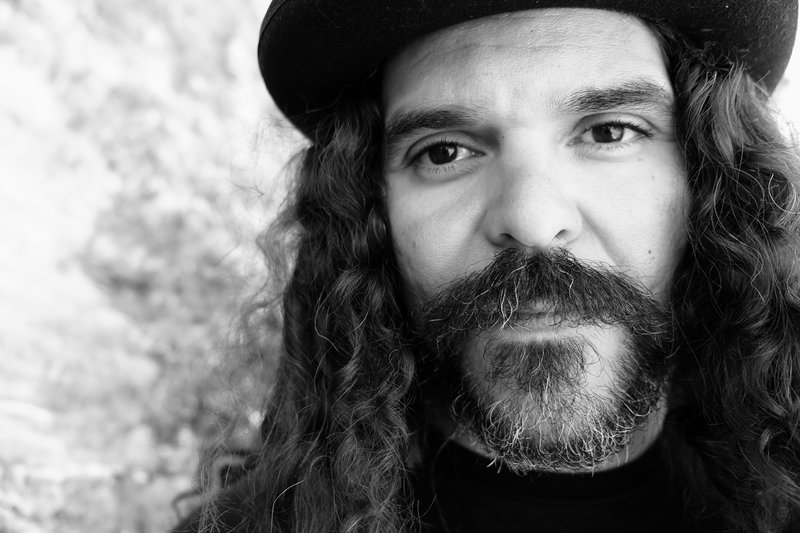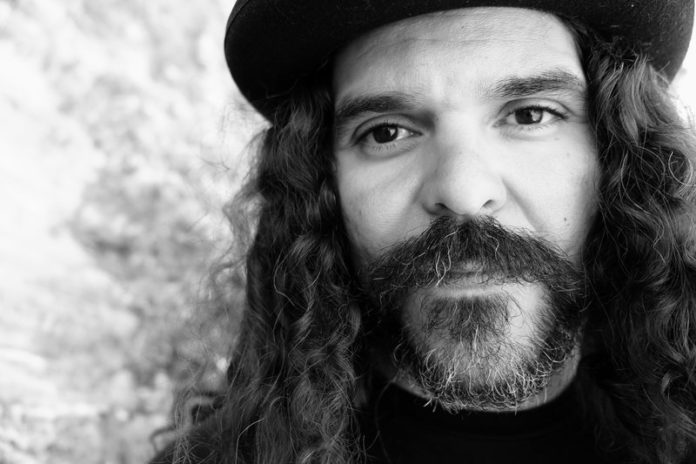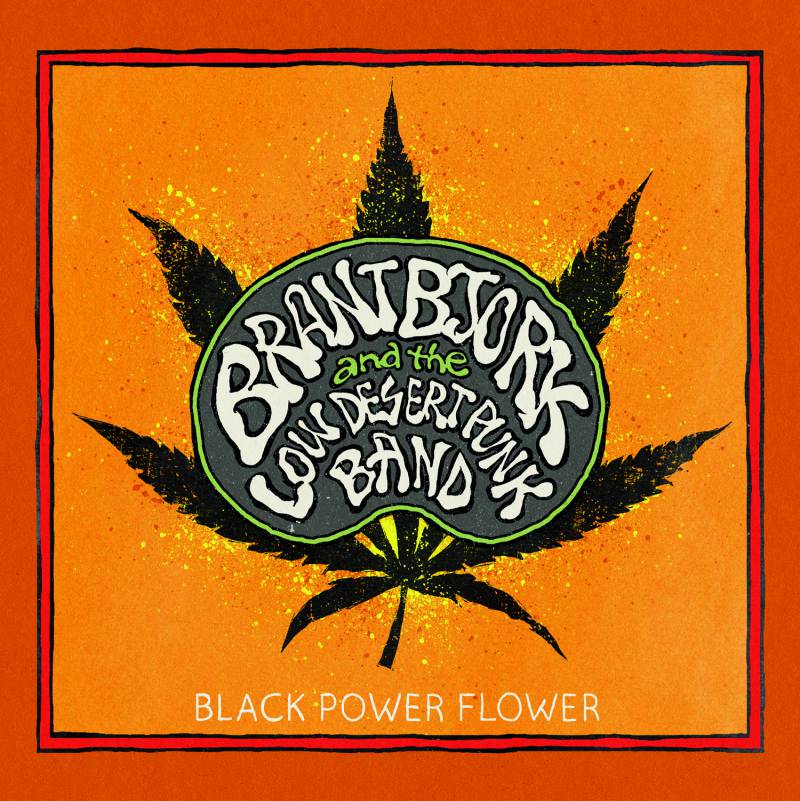In the early 1990’s, music critics declared that heavy metal was dead and that it had been replaced by alternative rock and grunge. At that time all eyes were on the Pacific Northwest, watching bands like Nirvana and Soundgarden take over MTV and the radio waves. Over a thousand miles to the south, however, Kyuss were forging a new sound, labeled “desert rock,” and “stoner rock.”
Brant Bjork, drummer for Kyuss, has become an integral figure to the desert rock scene, having worked as musician, producer, and even starting his own label. Known primarily as drummer, first with Kyuss, and then with Fu Manchu, Brant has also had a prolific career as a solo artist, and has often recorded most of the instruments on his own. Before setting out on his European tour, we had the opportunity to chat with him about his time in Vista Chino, his work as a producer, and his new album.
“I’ve always been a reaction to corporate rock.”
Metal Blast: You’ve been part of the Desert Rock scene for over half your life now, and you’ve drummed in some pretty influential bands. When you started releasing solo albums, though, there were a lot of people surprised at the different sound you had on your material. There was a lot more soul, funk, a little more blues, and even a Latin vibe going on. Did you set out to write less aggressive-sounding music as a solo artist, or had you tried to incorporate those influences in your previous bands?
Brant: Well, I obviously started out in bands like Kyuss and Fu Manchu. Those bands had a very specific agenda; I mean, those bands were both different in many ways. Kyuss, on some level, could be considered more progressive in terms of the approach of the creativity. But really, they were both just rock bands, playing rock music, and that was great, that’s what the plan was all along for those bands and I had no problem with that. When I became a solo artist, it was a liberation, because I was able to start pursuing other styles of music I was influenced by. I love rock music, rock and roll-based music, but I equally love blues, jazz, funk, and reggae, and I really can’t say I like one more than the other. So, when I was able to pursue my solo work, I was also more able to pursue those other influences.
MB: Gods & Goddesses was the first of your solo albums in which you had a backing band. Did you find it difficult to relinquish the controls in the studio, or did you just kind of step back and let everyone do their own thing on the songs?
Brant: Actually, Gods & Goddesses isn’t technically my first solo record with a band. I’ve recorded other records with some of my bands in the past. In Made By Magic, for instance, half of that record was performed with The Bros, and I performed Somera Sól with a band. I enjoy making records by myself, but I equally enjoy making records with bands.
Gods & Goddesses was a band effort in the recording, but I don’t think there was anything difficult about it at all. It was pretty straightforward; I showed the guys the material, we rehearsed it for about a week, and then we just went and recorded it. We performed it live, nailed all the basic tracks, and then I went back and did a few things, but that was it.
MB: A lot of people only knew you as the drummer in Kyuss and Fu Manchu back in the early days. How long have you been playing other instruments?
Brant: I got an acoustic guitar when I was probably around 13, so that’s mostly where I got my basic skills, bouncing around on a stringed instrument.
When I used to rehearse in Kyuss, I’d move all my shit to my room, and we rehearsed in my bedroom, so, I’d leave all the gear up. The gear would just be sitting there and [laughs] I’d just pick up Josh’s guitar, or Nick’s bass, and I’d just play. That’s really when I’d be writing and teaching myself to play, just sitting there messing around.
MB: You’ve also done some work as a producer, one of the most notable albums being No one Rides For Free by Fu Manchu, before you started drumming with them; you even started your own label around that time. Are you interested in doing more of the recording, production, and label stuff in the future?
Brant: Well, I guess it depends. It depends on the band and the project, you know. I mean, I’m not looking to start a career as a producer, for the sake of just being a producer. Production is an extension of my excitement and passion for a particular band or artist. If that happens, and an opportunity presents itself, I’d feel pretty excited about producing, but it’s not something I look to do as a full-time career or anything.
MB: So how active are you with the label right now? I’ve noticed a lot of bookings for Low Desert Punks Records popping up all over. Do you have much to do with the bookings, or do you have someone else doing that for you?
Brant: Nah, I’m not as hands on today as I used to be. Back in the early 2000’s, I took a really independent approach to my music, starting my own label and booking my own tours and stuff. To be honest though, as much as that move was “philosophical” it was also equally out of necessity. I needed to get to work, and back then it was difficult to find people that would support the kind of music and ideas I was pursuing. I didn’t waste time soliciting my “trip,” I just kind of started doing it myself. Now more of an interest has generated, to the point that I have people helping me.

MB: In 2010, a lot of people were shocked and excited to see news about Kyuss Lives! forming. How did that come about? Who approached who?
Brant: That started with John Garcia reaching out to me. He told me he had put a band together in Europe, and that he was going to do a European tour called “Garcia Plays Kyuss.” So, he asked if I was interested in coming over to Europe, bringing my band and being his supporting band. And I said “sure,” it sounded like fun. So I went over, we toured for a couple of weeks in Europe, and we had a blast. On that tour, John would ask me if I wanted to get up and play drums on “Green Machine,” or “Gardenia,” and I would say “sure, why not.” By the time that tour came to an end, we were at Hellfest in France, and Nick was there, and John asked me if I thought we should get him on the stage, and I was like “why not?” I couldn’t think of a reason why not to, so Nick got on the stage.
When we got home about a month later, John calls me and asks “hey man, what if you, Nick, and I got Bruno, and did some dates in Europe.” And, once again, I was like, “well, why not, that sounds like fun!” It just kind of snowballed, and we were like “wow, we’re really rocking here, what if we recorded some new material?” So, again [laughs] “why not?” Then somebody would be like, “hey come down to Australia,” or “come down to South America,” and you know how the story goes. We couldn’t think of a reason not to, we were having a lot of fun.
MB: Yeah, it was really cool seeing all of that go down. It got a little ugly at the end, with the lawsuit, and you wound up changing the name to Vista Chino. Do you feel like the name change represented a new band, or that it was still continuation of Kyuss Lives!?
Brant: Well, it perfectly represents what happened. As I said, we were spontaneously reacting to this musical movement like when we were younger. That was the original spirit behind Kyuss Lives!, at least in the beginning anyways. And then, you know, the beef happened, we just had to change the name. That was the only thing that we hadn’t really planned on [laughs]. We were kind of on this awesome trip, and then we got forced to change the name, so we changed it to Vista Chino.
MB: Vista Chino’s Peace was a really cool record. I believe it got a lot of good reviews, and you did some more touring. Can we expect any more material from Vista Chino?
Brant: It’s hard to say right now. I mean, everything kind of runs its course. I think from the first day John asked me if I wanted to get Kyuss back together with Nick, until about 6 months ago, I think we had a really good run. I think that was the natural life-cycle of that particular effort.
Is there another Vista Chino record with more touring in the future? It very well could be, I don’t know. It felt good, we had a good time, and then we unfortunately had the legal battle. That definitely had an effect on our good times [laughs] so things might have ended a little prematurely because of that, but it’s only natural. I think we’re all happy to be pursuing our own interest and our own projects, and if we come back together in the future, we’ll see what happens.
MB: So, going back to your solo efforts, you’ve been playing under the name Brant Bjork and The Low Desert Punk Band, and you’ve got a new album out. Is this another solo effort, or do you consider it to be a full-fledged band, like Brant Bjork and The Bros?
Brant: My bands for my solo work have always been loosely conceptual. It doesn’t really depend on a record, and it doesn’t really depend on who I’m playing with. It really kind of depends on where I’m at creatively, and what I’m feeling. Right now, and this goes back to your original question, I just like being able to take my solo career and indulge in different styles of music that I enjoy.
For this particular record there are different elements of many other styles, but it’s very much a heavy rock record, and it’s intended to be one. I assembled this band with that in mind, and I wanted to give the band its own name. So I thought, “well, if the Low Desert Punks started a heavy rock band, what would we call it?” Well, we would call it the Low Desert Punk Band.
MB: So the new record is going back to a heavier sound?
Brant: Yeah! The record is very specific in its approach of just being a very heavy rock record. As a band, though, and specifically as a traveling band, we’re dabbling with all my catalog, and there’s more of a dynamic in the live show. We’re playing older stuff, groovier stuff, some heavy stuff, we’re doing a little bit of everything, so the people that come out to the show get multiple flavors.
MB: I’ve noticed another recurring theme in your music as well. With the current band name, Low Desert Punks, and a previous record called Punk Rock Guilt, I was curious about how important punk music is to you still?
Brant: I think when I was becoming a musician in the early 80’s, punk rock was something I really created a creative, musical, and artistic identity with. It gave me, and a lot of other people, the idea that I could get involved with music, but it was kind of more from an “artistic” approach, rather than musical. I viewed it as a source of energy and creativity, and that’s how I’ve always viewed punk rock. I was raised by older guys who were a generation older than me, and they turned me on to the first and second wave of punk at a young age. It just called to me. I think, to me, the original spirit of punk was about creativity, and inspiring art. “Fighting the man” kind of thing. I’ve always carried that with me in my career, and I like the idea of not allowing myself, or punk, to become this thing that represents mohawks and hardcore music. I mean there’s nothing wrong with that, but it’s not how I look at punk rock.
MB: Right, it was more of a set of ideals than a sound.
Brant: Yeah. It was a reactionary thing, it was a reaction to corporate rock. And that’s what I am, a reaction to corporate rock, I’ve always been a reaction to corporate rock. I just use “punk” in the same way you’d use “rock and roll.”
MB: Yeah. A lot of people forget that a lot of the early rock artists like Elvis, or the rockabilly guys like Gene Vincent were considered very rebellious in their time.
Brant: It was VERY rebellious! Especially with the original black artists, you know, like Chuck Berry and Bo Diddley, it was really rebellious for those guys.
MB: Alright man, that’s about it, do you have anything you’d like to say to the fans?
Brant: We’re just going to keep on keepin’ on, and if you’re down, jump on board and let’s do it!
MB: Excellent, thanks for talking with us!
Brant: You bet!


